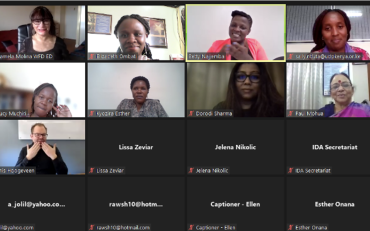On International Women’s Day, IDA, as a partner with the Inclusive Futures Consortium hosted a webinar that sought to center voices of women with disabilities.
The webinar had speakers offering their learnings, based on their expertise and lived experiences on how they were working to address systemic discrimination directed towards women and girls with disabilities.
The speakers were:
- Esther Kyozira, CEO, National Union of Disabled Persons of Uganda (NUDIPU)
- Esther Onana, Kenya Network of Women and Girls with Disabilities
- Lucy Muchiri, Technical Advisor for social inclusion, Sightsavers, Inclusion Works PMU
- Mohua Paul, Co-founder and Chairperson, Access Bangladesh Foundation
- Pamela Molina, Executive Director, World Federation of the Deaf (WFD)
- Sally Nduta, CEO, United Disabled Persons of Kenya (UDPK)
The webinar was moderated by Elizabeth Ombati, Inclusion Works (IW) OPD Engagement Officer, Kenya while Betty Najjemba, IW OPD Engagement Officer, Uganda consolidated the key messages from the webinar and made the closing remarks.
The following offers some insights on what it will take to meaningfully support the inclusion of women and girls with disabilities in society as shared by the speakers
- The need to keep advocating for space as women with disabilities in political, economic, social, cultural spheres.
- To keep advocating for accessible environments, accessibility in all its dimensions, to the physical environment, to information, communication and technology; to social environments etc
- To keep advocating for increased numbers of women in organisations of persons with disabilities (OPD) to add weight to push different agenda and issues affecting women and girls with disabilities.
What they said
Support to girls and women with disabilities is still mainly coming from family and friends. This is not sustainable. Families face a lot of financial difficulties. Supports from the state and other development partners must therefore take into consideration measures such as social protection to reach girls and women with disabilities to support their inclusion in the community.
Meeting others was greatly beneficial. To meet other women with disabilities, to start collective advocacy. To challenge existing barriers. This was very important in my life journey. “We have seen our advocacy bear fruit over the years,” said Mohua Paul.
For Uganda, as Esther Kyozira said, specifically looking at the concluding observations from the CEDAW Committee to Uganda and regarding those that touch on women and girls with disabilities. She noted the importance firstly to work with the mainstream women’s rights movement but also specifically the need that OPDs of women with disabilities are funded to keep doing awareness raising on the concluding observations; and also the need for the Ugandan Government to have a costed strategy on how it is going to fulfil its obligations as relates the CEDAW Committee concluding observations.
Esther Onana spoke about the uphill task that women with disabilities face in political representation. She spoke about laws that only see a person as being homogenous. A woman as just that, a woman, and in essence refusing to acknowledge the multiple discrimination women with disabilities face in party politics, sharing a case of Kenya. “Our issues as women with disabilities in political processes must be mainstreamed,” she said.
Sally Nduta spoke about the need for donor agencies to work with the priorities of OPDs. She shared that there is an urgent need for donors and governments to acknowledge the unique space that OPDs occupy. The need to carry out assessments of their capacities with the aim to strengthen them. To re-look at some criteria put forward for example in terms of funding the OPDs with very stringent criteria that locks out most of them. She also spoke about the need to look at OPDs as equal partners in projects and make visible the work that they do.
Lucy Muchiri, in her reflections from Inclusion Works offered several reflection points including that; the nature of gender inequality is context specific, what is experienced in one country is totally different from the other countries even with countries who have close boundaries; that IW had to consider diverse ways to address existing gender imbalance and this included closing working with OPDs to better understand the experiences of girls and women with disabilities.
She noted that one of the key gaps observed was that even with a gender action plan in place, they had to learn and adapt things as they moved forward. “We learnt the importance of conducting a gender analysis at the beginning of the programme to guide the programme throughout implementation and the need to include gender actions within the main implementation plan rather than having a separate plan,” she said.
Pamela Molina shared some preliminary findings from a WFD - CBM GLOBAL study on Nigerian Deaf Women Access to Health Services in Emergencies and Disasters.
Some recommendations from the study included the urgent need to include as staff professional and accredited sign language interpreters in medical facilities, and include budget to make it happen at local, state and national levels; that organizations of persons with disabilities must participate at the decision-making levels in equal basis with others regarding public policies and in addition that there is further research to dig deeper into the issues deaf women and girls face, with intersectional focus.
